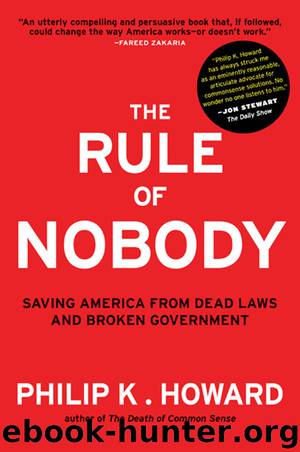The Rule of Nobody: Saving America from Dead Laws and Broken Government by Philip K. Howard

Author:Philip K. Howard [Howard, Philip K.]
Language: eng
Format: mobi, epub
Publisher: W. W. Norton & Company
Published: 2014-04-14T04:00:00+00:00
No is the answer to all these questions: The President lacks the authority to make basic executive judgments. Slowly but surely, presidential powers have eroded to the point where the President cannot do the job.
Running any large organization, not to mention the world’s largest government, is fraught with the difficulty of nonresponsiveness. It’s too big to direct from the center. When Eisenhower was about to take office, President Truman famously contrasted running government with the army: “He’ll sit here, and he’ll say, ‘Do this! Do that!’ And nothing will happen. Poor Ike—it won’t be a bit like the Army. He’ll find it very frustrating.”
Every president has confronted difficulties in governing. Even Truman, however, could not have imagined the legal tangle that has overgrown the White House. The President often has to get judicial permission—whether related to firing personnel, or letting contracts, or approving vital infrastructure. In domestic policy, the President is little more than a worker tending to Congress’s massive legal machine. The fact that much of this legal machinery was imposed by legislators long gone, reflecting past priorities, only rubs salt in the constitutional wound.
The decline of presidential authority since the New Deal has been dramatic. For example, two months after the Civil Works Administration became operational in 1933, the person FDR had put in charge, Harry Hopkins, had employed 2.6 million people in thousands of rebuilding projects. By contrast, when Congress authorized an $800 billion stimulus package in 2009, the President had no authority to build anything, and most of the funds got diverted to a temporary bailout of insolvent states. The money was basically wasted.
Congress today sees its role as constraining executive decisions rather than empowering them. Its first salvo after the New Deal was to subject most agency decisions to judicial review (the 1946 Administrative Procedure Act). Abuses of power by Presidents Johnson and Nixon provided fresh impetus to rein in what Arthur Schlesinger Jr., capturing the mood of the 1960s, called “the imperial presidency.” One by one Congress removed presidential management prerogatives: putting tight controls on advisory committees (the 1972 Federal Advisory Committee Act, known as FACA); removing any flexibility not to spend allocated funds to avoid waste (the Impoundment Control Act of 1974); and not renewing presidential authority to reorganize executive agencies in 1984.
These limits on presidential authority had predictable effects. For example, in 2010 almost $500 million was spent on the Ares I rocket program after it had been canceled, but the President had no authority to impound the money. The President’s powerlessness to reorganize executive departments is one reason the President cannot consolidate the eighty-two separate teacher training programs.
Courts too got into the act of constraining presidential power, adopting the philosophical mind-set of Rule of Law theorists, who objected to the New Deal: The more judicial control, the better. The President’s inability to streamline environmental review, as I will shortly discuss, was the effect of an appellate court ruling in 1971.
There have been efforts since the 1980s to restore some presidential authority.
Download
The Rule of Nobody: Saving America from Dead Laws and Broken Government by Philip K. Howard.epub
This site does not store any files on its server. We only index and link to content provided by other sites. Please contact the content providers to delete copyright contents if any and email us, we'll remove relevant links or contents immediately.
Day by Elie Wiesel(2781)
The Age of Genius by A. C. Grayling(2584)
Gideon's Spies: The Secret History of the Mossad by Gordon Thomas(2346)
The Gulag Archipelago (Vintage Classics) by Aleksandr Solzhenitsyn(2096)
FATWA: Hunted in America by Pamela Geller(2011)
Columbine by Dave Cullen(1863)
Men Explain Things to Me by Rebecca Solnit(1724)
The Rule of Law by Bingham Tom(1690)
Anatomy of Injustice by Raymond Bonner(1664)
Examples & Explanations: Administrative Law by William F. Funk & Richard H. Seamon(1642)
Three Cups of Tea by Greg Mortenson(1613)
The Source by James A. Michener(1603)
That Every Man Be Armed by Stephen P. Halbrook(1578)
ADHD on Trial by Michael Gordon(1574)
Future Design by Unknown(1567)
Gideon's Spies by Gordon Thomas(1503)
Palestinian Walks by Raja Shehadeh(1494)
Constitutional Theory by Carl Schmitt(1451)
Nothing to Envy by Barbara Demick(1445)
